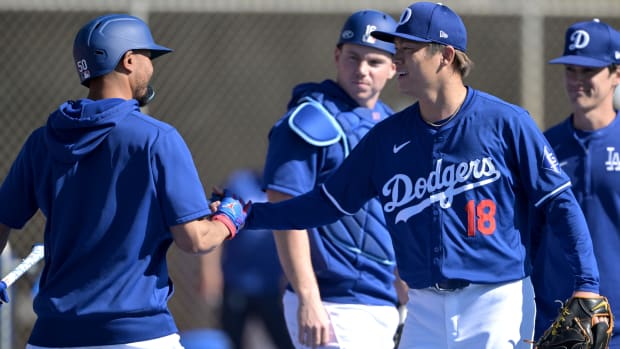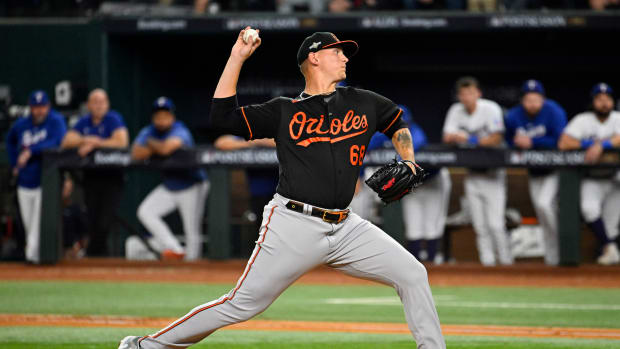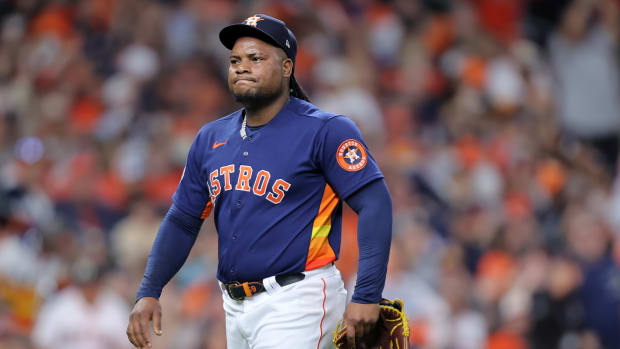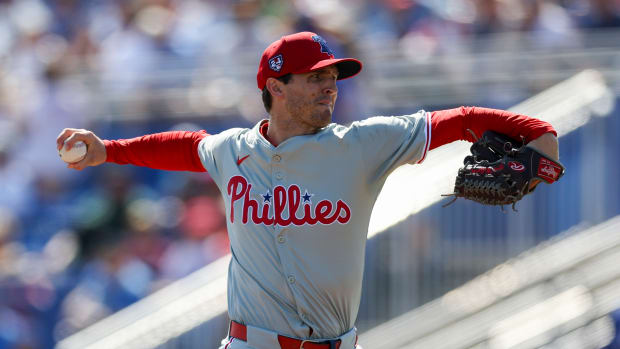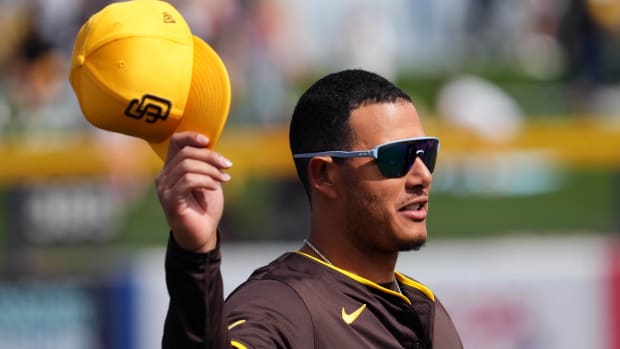
NLDS Game 4: Cardinals, short rest bad combo for Kershaw, Dodgers
Start Time: 5:00 p.m. ET
TV: FOX Sports 1
Series: Cardinals lead 2-1
Starting Pitchers:Clayton Kershaw (21-3, 1.77 ERA) vs. Shelby Miller (10-9, 3.74 ERA)
In his return from a 23-day layoff due to shoulder inflammation, Hyun-Jin Ryu gave the Dodgers everything they could have hoped for — six strong innings and 94 pitches of one-run ball — and yet it still wasn't enough. Their shaky bullpen bridge gave way over the course of just a few pitches from Scott Elbert, magnified by the offense's 1-for-11 bellyflop with runners in scoring position. Now the 94-win team has been pushed to the brink of elimination, with its route to Game 5 resting on the shoulder of its ace — on three days' rest and coming off a humiliating Game 1 collapse.
• Complete postseason schedule, start times and TV listings
Dodgers need vintage Kershaw to keep season alive in NLDS
The good news for the Dodgers is that Kershaw has done this before. Exactly one year ago, in Game 4 of the Division Series against the Braves, he threw six innings and 91 pitches, allowing just three hits, one walk and two unearned runs while striking out six; his team prevailed in the late innings via Juan Uribe's tie-breaking home run, ousting Atlanta. By Game Score (67), that actually stands as the third-best of his seven career postseason starts, outdone only by his first start in that series and his first start in the ensuing NLCS against St. Louis (six innings, one unearned run in a 1-0 Game 2 loss). The bad news, in addition to the fact that this time it's his own team with its back to the wall, is that the recent history of starters on three days' rest in the postseason is not an encouraging one, and that this Cardinals offense has particularly bedeviled him.
First, the big picture. Via the Baseball-Reference.com Play Index, pitchers have made a total of 86 starts on three days' rest during the Wild Card era (1995 onward). Because the PI "clock" only measures postseason time, the count may miss a few pitchers whose first Division Series start may have come three days after a regular-season appearance, such as Chris Carpenter in 2011 (three innings, 64 pitches, four runs), and it may include pitchers whose previous appearance came in a relief stint. Nonetheless, the numbers aren't pretty.
In those 86 starts, pitchers averaged just 5.4 innings and 23.3 batters faced. The 78 for which B-Ref has pitch counts averaged just 91 pitches, with four 1999 starts that lasted three innings or fewer lacking such data (three lasted no longer than an inning). In those 86 starts, pitchers managed just a 4.52 ERA, a rate inflated by a .317 batting average on balls in play; their 3.4 walks, 8.0 strikeouts and 1.1 homers per nine crunch to a 4.18 FIP.
• CORCORAN: Can Nationals continue comeback in NLDS Game 4?
The tactic has become much less prevalent over time; 60 of the 86 starts came between 1995 and 2003, with just 26 from 2004 onward. Limiting the data to just those 26 starts doesn't change much; the remaining pitchers put up a 4.45 ERA and 3.82 FIP over 5.3 innings per start, averaging 22.8 batters faced and 86 pitches. Most notably, they trimmed their homer rate to 0.8 per nine, but then the longballs and scoring rates have both declined from their turn-of-the-millennium peaks.
Win away from NLCS, Cardinals enter familiar October territory
Given an offense that has scored just four runs over the past two series games, a wobbly five- or six-inning start from Kershaw with three runs allowed may not be enough, but it would certainly represent an improvement over Friday's collapse. Forget the allegations of sign-stealing or pitch-tipping. Pitching out of the stretch for the first time all day, and in unseasonably warm temperatures, Kershaw lost his release point, missed his spots and fell into a predictable fastball-heavy pattern; see the great work by Dodger Digest's Mike Petriello and FanGraphs' Jeff Sullivan for the dissection.
A tenacious Cardinals lineup feasted on those mistakes, collecting five singles in a span of six batters to cut a 6-1 lead to 6-4. Dodgers manager Don Mattingly decided to press his luck as far as it would go, and so after Kershaw struck out rookie pinch-hitter Oscar Taveras, he was allowed to face Matt Carpenter, who continued his grand tradition of breaking the Dodgers' hearts by lashing a three-run double. Carpenter was at it again on Monday night, collecting his third series homer in as many games — the sole blemish on Ryu's line — and adding a double off Elbert. He's now 6-for-12 in the series with three doubles to go with his homers, good for a 2.038 OPS that maybe — just maybe — hints at the need for the Dodgers to handle him differently.
• CORCORAN: Wong, Carpenter power Cardinals past Dodgers in Game 3
Going up against Kershaw will be 23-year-old righty Shelby Miller, whose sophomore season was not as strong as a rookie campaign that nonetheless ended with him stashed in the bullpen and limited to one postseason inning plus a whole lot of questions as to why he was even on the roster. Though he made 31 starts and totaled 183 innings, Miller's peripherals declined across the board; he yielded 1.1 homers, 3.6 walks and 6.2 strikeouts per nine en route to an ugly 4.54 FIP, up from 3.67 in 2013; only a .259 BABIP kept his ERA in the vicinity of league average. His 45-percent quality start rate, though a slight improvement on last year, nonetheless illustrated a pitcher on a short leash; where he was worth 3.4 Wins Above Replacement last year, he managed just 1.6 this year.
Giants uncharacteristically stumble, Nationals find form in NLDS Game 3
That said, Miller did pitch better in the second half (2.92 ERA, 4.20 FIP) than the first (4.29 ERA, 4.77 FIP) thanks to increased reliance and effectiveness of his curveball en route to vast improvements in his strikeout and walk rates. By percentage of batters faced, the former improved from 15.4 percent to 18.7 percent, while the latter dropped from 11.4 percent to 6.6 percent, resulting in a doubling of his K/BB ratio, from 1.4 to 2.8. An absurdly low .215 BABIP over the latter stretch didn't hurt, either. From Aug. 23 to Sept. 18, he reeled off six straight quality starts while posting a 1.62 ERA.
Miller made two appearances against the Dodgers in 2014, the first a six-run, five-inning pounding in Los Angeles on June 29, part of a rough five-start stretch that led the Cardinals to limit him to one inning in a 15-day span around the All-Star break; that lone inning came in a July 20 bullpen stint against the Dodgers in St. Louis. In his start, Yasiel Puig and Matt Kemp both doubled off Miller, while Andre Ethier hit a three-run homer. For the season, Miller showed almost no platoon split, yielding a .235/.301/.388 line to righties and .238/.321/.388 to lefties, the difference almost entirely resting on a higher walk rate against the latter.
UPDATE: In an obvious panic move, Puig — who tripled and scored the Dodgers' only run on Monday and has a .357 OBP for the series — will sit for Game 4, with Ethier replacing him in centerfield. Carl Crawford will take Puig's second spot in the order, while Ethier will bat sixth.
The Dodgers hit righties well during the season (.271/.334/.412) and have done even better against them in the series (.343/.389/.493), but the team as a whole has hit just .206/.229/.265 (7-for-34 with two doubles) with runners in scoring position compared to the Cardinals' sizzling .308/.400/.577 (8-for-26 with three extra-base hits). It hasn't been enough, and unless Kershaw can undo the damage he did with his Game 1 collapse — avoiding the perils of the Dodgers' middle relief while bucking the larger trend of starters limping through their postseason turns on three days' rest — it won't be.






























